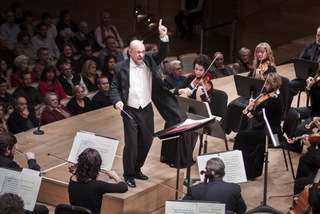|
Back
Orchestre Métropolitain Chases Away Winter Blues Montréal
Maison symphonique de Montréal, Place des Arts
02/07/2013 -
Leonard Bernstein: Candide: Overture – West Side Story: Symphonic Dances
George Gershwin: Cuban Overture
Michael Daugherty: Metropolis Symphony (Excerpts)
Aaron Copland: Concerto for Clarinet, Strings, Harp and Piano
Simon Aldrich (Clarinet)
Orchestre Métropolitain, Jean-François Rivest (Conductor)

J.-F. Rivest (© Philippe Jasmin)
Montreal’s “second” orchestra, Orchestre Métropolitain, is on a roll. While the temperature pushed minus 20° Celsius outdoors Thursday night, patrons in a sold-out house enjoyed a sizzling “pops” concert under the dynamic direction of guest conductor Jean-François Rivest (this follows a glorious Bruckner Sixth led by Principal Conductor Yannick Nézet-Séguin in December). Rivest, artistic director of the Orford Arts Centre near Montreal, presented works by four 20th- century American composers in a concert billed as “Bienvenue en Amérique”/“Made in the USA”.
The evening kicked off with not one but two overtures. The first, Leonard Bernstein’s iconic but ever-fresh Overture to Candide, was bright and jauntily paced–the perfect antidote to the winter blues. Rivest drew riveting performances from the winds, especially the two flutes, and a warm, luscious sound from the strings. The second, George Gershwin’s less familiar Cuban Overture, written during a trip to Havana in 1932, features traditional Cuban percussion instruments such as maracas, bongos, graters and claves in the fevered rhythms of the rumba. Rivest’s attentive conducting produced smooth, evenly-balanced sectional playing in this complexly-orchestrated work. The brass and solo clarinet were superb.
This was followed by an even more unfamiliar, if not more challenging, and eclectic work by Michael Daugherty (born 1954)–excerpts from his Metropolis Symphony. Based on the Superman comic strip, the three of five movements chosen–I. “Lex”, III. “MXYZPTLK” and V. “Red Cape Tango”–illustrate, according to the program notes, Superman’s efforts to subdue three arch-enemies–the mad scientist Lex Luthor, the villainous imp from the fifth dimension with the unpronounceable name of Mr Mxyzptlk and Doomsday, who reputedly succeeded in eliminating Superman. The frenetic first movement, driven by whistles, devilish dances on the solo violin (deftly delivered by Yukari Cousineau) and trombone glissandos conjured up a cacophony of excitement and impending doom. The second featured a lovingly-rendered melancholy flute solo by Marie-Andrée Benny. The third, however, was marred by the composer’s myriad repetitions of the Gregorian “Dies irae”. The program notes indicated timing for the three movements of 20 minutes; in fact they took well over 30 minutes.
After intermission, Aaron Copland’s Concerto for Clarinet, Strings, Harp and Pianosuffered from an uninspired performance from Simon Aldrich. (Although billed as the Orchestre Métropolitain’s principal clarinet, another inconsistency in the same program has François Martel listed as the orchestra’s principal clarinet.) Despite Aldrich’s warm tone and solid technique, he failed to match the orchestra’s expressivity and verve, particularly in the potentially dazzling cadenza connecting the languid first movement and the more feverish second.
.
Capitalizing on the eight percussionists required for the Gershwin (and an expanded orchestra), the concert concluded with a third brash percussion-oriented work—Bernstein’s Symphonic Dances from West Side Story. Although framed by a slightly ragged beginning from the brass and an unconvincing conclusion, there was a lot of fine playing, particularly from the principal horn, Pierre Savoie, and the percussionists. The additional duties of finger snapping, “mambo!” cries and whistles blended seamlessly with the swing ambience in the work. The slower sections, “Somewhere” and “Meeting Scene”, could have had more support from the strings, especially from the double-basses.
This concert was dedicated to the memory of cellist and conductor Yuli Turovsky who died on January 15. Turovsky founded the I Musici de Montreal chamber orchestra and was one of the founders of the Borodin Trio. His wife, Eleonora, who served as I Musici’s concert mistress, preceded him last March.
Earl Arthur Love
|